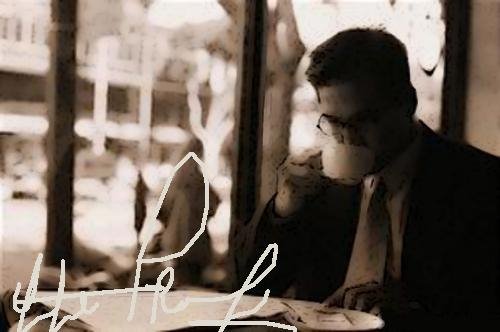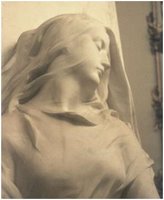 Allegorically SpeakingOr Not
Allegorically SpeakingOr NotPerhaps the single most common question about The Chronicles of Narnia asks whether Lewis wrote the series as an allegory. Even if your Biblical knowledge is limited to a few Sunday school classes in third grade, most people would agree, you probably notice that Aslan has many similarities to Jesus Christ. If Lewis added that symbolism on purpose, does that mean that everything in Narnia represents something in the Bible?
C.S. Lewis makes clear that he
did not write the Narnian Chronicles as a Biblical "allegory."
But you may be asking: How can this be true given the obvious symbolism used throughout the series?
In order to understand Lewis's side of the story, you need to understand the difference between
allegory and something he called
supposal.
The Gory Details Of AllegoryAn allegory is a literary device in which an Author uses the form of a person, place, or animal to represent an abstract idea. For example, an eagle can represent the abstract concept of "freedom," or a Witch can represent "evil."
Much of History's Literature is allegorical, for instance, Dante Alighieri's
The Divine Comedy, represents humanity as the protagonist journeys through Hell, Purgatory, and Paradise. John Bunyan's
The Pilgrim's Progress, revolves around concepts like Faith, hope, and mercy, as they become real-life characters in his saga of a man (named Christian) fleeing the wrath to come. So too, Lewis's first book written after his Christian conversion was
The Pilgrim's Regress, a Bunyan
esque allegory that describes his road to the Christian faith.
In
The Allegory of Love, Lewis writes that when you use allegory, "you can start with [facts]...and can then invent...visible things to express them." He adds, "What is good or happy has always been high like the heavens and bright like the sun. Evil and misery were deep and dark from the first."
A broader definition applies when an Author represents real people or places in a fictional context. George Orwell's
Animal Farm is a well-known example of this allegorical type. As a way of addressing the issues surrounding the Russian Revolution, Marx, Lenin, Stalin, and other real Historical figures are represented as pigs on a farm.
The Chronicles of Narnia is not in this genre. Lewis did not write the series as an allegory, i.e., using his fantasy setting to represent abstract concepts or real people. In terms of literary style, the series bears no parallels to allegorical works like
The Divine Comedy,
Animal Farm, or even Lewis's own
The Pilgrim's Regress.
In fact, Lewis explicitly warns readers
against trying to make a one-for-one match between Narnia and the real world. In a letter to a class in Maryland, he writes, "You are mistaken when you think everything in the books 'represents' something in this world. Things do that in
The Pilgrim's Progress but I'm not writing in that way."
Supposedly, There Is A SupposalAlthough Lewis makes it clear that
The Chronicles of Narnia is not an allegory, he does not deny that symbolism was written into the series. But to understand his approach, you need to recognize that Lewis differentiates allegory from something he calls supposal. In a letter to a girl named Sophia Storr, he explains the difference:
"I don't say, 'Let us represent Christ as Aslan.' I say, 'Supposing there was a world like Narnia, and supposing, like ours, it needed redemption, let us imagine what sort of Incarnation and Passion and Resurrection Christ would have there.'"
Allegory and supposal are not identical devices because they deal with what is real and what is unreal quite differently. In an allegory, the ideas, concepts, and even people being expressed are true, but the characters are make-believe. They always behave in a way reflective of the underlying concepts they are representing.
A supposal is much different; the fictional character becomes "real" within the imaginary world, taking on a life of its own and adapting to the make-believe world as necessary. If, for example, you accept the supposal of Aslan as true, then Lewis says, "He would really have been a physical object in that world as He was in Palestine, and His death on the Stone Table would have been a physical event no less than his death on Calvary."
Aslan is not an allegory of Jesus Christ. Instead, He's a supposal. Lewis emphasizes this point in one of his letters:
"[Aslan] is an invention giving an imaginary answer to the question 'What might Christ become like if there really were a world like Narnia and He chose to be incarnate and die and rise again in that world as He actually has done in ours?' This is not allegory at all."
Much of The Chronicles of Narnia is built on the concept of supposal. For example:
Suppose Christ came into the world of Narnia as Aslan. What would He be like?
Suppose Aslan created Narnia out of nothing and centuries later brought it to a conclusion. How would these stories play out ?
Suppose evil were introduced into Narnia. What would that be like?
Suppose a person or talking animal could freely obey or disobey Aslan. What would life in Narnia be like?
If we understand this vital difference between allegory and supposal, it should make us value the Imagination a bit more...as both Lewis and McDonald spoke of: "purifying the Imagination."
This is a process the Puritans understood, and most of us have forgotten. It involves the beauty of a supposal, with the truths of an allegory.
Don't understand? Maybe it's time to purify the Imagination.
Don't know how? Start with Lewis.
 What The Prof Is Reading Now
What The Prof Is Reading Now 


.jpg)















